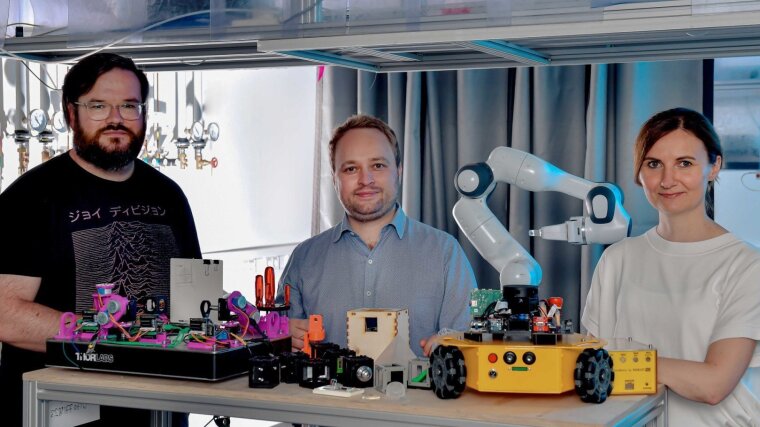
- Awards and Personnel
- Studies and Teaching
Published: | By: Sebastian Hollstein
The “Innovation Methods in Photonics” course at Friedrich Schiller University Jena has been recognised for successfully combining theory and practice, winning the University’s 2022 Teaching Award for the best course. The University’s Academy for Teaching Development honoured the organisational trio of Sabine Best, Johannes Kretzschmar and David Zakoth with the award, which comes with prize money of 2,500 euros, provided by Sparkassenstiftung Jena-Saale-Holzlandkreis, and will be presented during the “Dies Legendi” awards ceremony on 22 November 2022.
The jury emphasises that the course, which is offered within the “Photonics” Master’s programme of the Faculty of Physics and Astronomy at the Abbe School of Photonics, is particularly successful in promoting scientific work, while at the same time ensuring strong practical relevance for the students through close cooperation with regional companies and research institutes.
“The course is not purely about photonics. Instead, the students receive knowledge from a wide variety of disciplines,” says David Zakoth. “The aim of the course is for students to learn to understand innovation processes in photonics companies and to drive them forward themselves. At the same time, they develop entrepreneurial skills, so that they can independently exploit scientific ideas commercially. These are skills that are important for professional careers – whether the students later work in companies or in research, or want to found a start-up themselves.”
Three formats in one course
The mix of theory and practice is particularly successful through the combination of different teaching formats: in traditional lectures, participants are given theoretical knowledge on topics such as innovation management, entrepreneurship or intellectual property rights. Experts from business practice and research supplement the theoretical input with reports of their own experiences. According to Sabine Best, learning is particularly application-oriented in workshops: “Here, the students become familiar with a variety of rapid prototyping technologies, such as 3D printing or laser cutting, so that they can engage in hands-on work on their own projects. We also run a Design Thinking workshop at the beginning of the course, so that the students can quickly develop creative ideas and design their first demonstrators.”
Cooperation with partners from the field in the Makerspace
In the practical part of the course, the student teams need to come up with innovative ideas: “In preparation for the course, we work with companies and research institutes to identify current technical issues for which the partners from the field are still looking for answers. And the students work out creative solutions for these challenges during the course and then implement them in the form of prototypes,” explains Johannes Kretzschmar.
The “Lichtwerkstatt Jena” – the Makerspace at the Abbe Center of Photonics – is available for this purpose. This idea and prototype laboratory, which is funded by the German Federal Ministry of Education and Research, offers students the opportunity to try out the unique technical equipment and develop ideas and solutions at any time. According to the trio that organised the award-winning course, the Lichtwerkstatt was an important catalyst for the development of the course, as the Makerspace has been bringing together theory and practice for years.
The response to the course has been very positive. The participants are extremely grateful for the practical input. The partners from the field also appreciate the creative drive of the student teams. “Many of the participants from companies and research institutions tell us that they would also have liked to have a module like this during their studies. Some were so enthusiastic about the student teams that they continue to work with them after the end of the course,” says Johannes Kretzschmar.